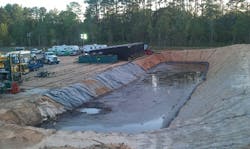Filtration for Fracking
The use of large amounts of fresh water for hydraulic fracturing (fracking) is necessary to complete shale gas wells and begin gas production. In fact, millions of gallons of freshwater are required to develop a single successful well.
Waters are combined with “mud” and used as drilling fluids to drill the well. As the drilling proceeds, used drilling fluid is pumped into a reserve pit for storage and disposal. The issue of managing reserve pit fluids is key to shale gas operators for cost reduction and water conservation.
At many shale gas well locations, reserve pit water builds up and is pumped out and transported to disposal sites. This causes operators to incur significant transportation and disposal expenses. To reduce operating expenses and get maximum benefit from the pit water on hand, water reuse is becoming a more desirable option. Once filtered, the pit water can be blended with freshwater to be utilized for hydraulic fracking operations, thereby reducing demand for freshwater.
Managing pit water ineffectively could reduce a well’s productive life and lower its yield. This presents producers with a problem, as filtering reserve pit water is a task beyond the abilities of most conventional filtration systems, potentially resulting in low flow rates, inadequate solids removal and environmental spillage.
During a fracking operation conducted this summer with a natural gas producer in the Haynesville shale play, Layne Christensen Co. deployed the Integra Disk Filtration System to facilitate solids removal for the reuse of reserve pit water in the producer’s fracking operations. On this site, management of pit water disposal was especially challenging, as the producer was faced with escalating water sourcing costs and transportation expenses for pit water disposal. Additionally, the producer had previously experienced poor performance from a bag filtration process. While effective in many applications, bag filters were prone to rupturing and bypass, which potentially allowed solids to be introduced into the fracking process. These bag filters were unable to filter the high concentration of solids in the pit water, which resulted in down time due to frequent media exchange.
Disk Filtration Solution
To alleviate these problems, the producer implemented the Integra Disk Filtration System from Layne for its reserve pit water filtration. The Integra system is a rugged, automated, backwashable disk filter capable of processing waters with high solids content, making it well-suited to handle waters with high TSS combined with drilling pit water, and capable of removing solids to lower levels than other filtration options. The Integra operates at high flow rates and can process more than 12,000 barrels of water per day as part of integrated recycling efforts.
The Integra system provided a number of improvements over previous conventional filtration systems that had been used. Utilizing a torturous path between contacting surfaces, Integra is able to filter a higher concentration of solids - up to a 2,000 TSS load - than previous methods, which can handle a TSS load of about 400. Integra has no bags or membranes that can rupture, so no time was lost due to media change. This prevented solids from entering the fracking process. Integra also filtered at much higher flow rates than previous filtration methods used.
Positive Results
With Integra filtering out mud, sand, chemicals, limestone, salt, cuttings and debris from stored reserve pit water at a flow rate matching the fracking operations, filtered reserve pit water could be blended into real-time fracking operations at a 10:1 blending rate. The solids removed from the filtration process were then returned to the pit, allowing for a closed loop operation.
Benefits for the producer were numerous: lower demand for freshwater, elimination of transportation and disposal of pit water, reduced water storage needs, a smaller storage footprint, elimination of down time for cleanup of leakage and media exchange, and a positive environmental effect. This made Integra the most effective, cost-efficient, cleanest and environmentally sound solution for pit water reuse for this shale gas producer.
Water Management Services
Additionally, the Integra Disk Filtration System is being utilized for reuse of flowback and produced waters on shale gas sites.
The Integra filter is an important component of Layne’s water management services, and to support its services in the oil and gas markets the company has established new offices in Austin, Texas, and Pittsburgh, with an associate Layne office in every major shale play in the U.S.
Layne’s water management services are helping operators manage, transfer and recycle reserve pit water and frack flowback water in a cost-effective and environmentally responsible manner. For those waters that cannot be effectively treated and reused, Layne offers zero-liquid discharge through the EVRAS evaporative crystallization system.
For more information contact:
Layne Christensen - Water Technologies
2101 Donley, Suite 108
Austin, TX 78758
817.676.8227
